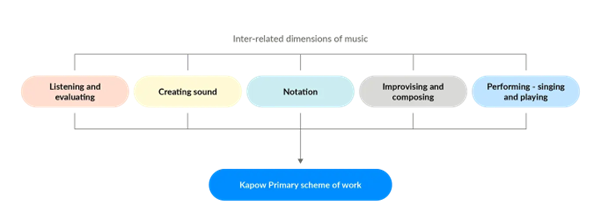Music Intent Statement
At Thirsk Primary, our music curriculum is designed so that pupils see themselves as musicians from the very beginning of school, building from the exploratory, sensory, expressive experiences of EYFS into secure, sequenced learning across KS1 and KS2.
We support pupils to become confident listeners, performers and composers so that they can create, understand and evaluate music across a wide range of traditions, genres and cultures. Music at Thirsk is for every child – not a specialist pursuit for a few.
Our intent is that pupils:
· build ambitious aspirations beyond their immediate experience
· show compassion and respect toward musical traditions and identities that differ from their own
· experience genuine inclusion – all children able to participate, achieve and feel represented
Our curriculum design is informed by cognitive load theory. New knowledge is introduced in small, well–sequenced steps, with frequent retrieval and structured rehearsal so that pupils store core musical ideas in long-term memory. Prior knowledge is deliberately reused so that learning becomes automatic and does not overwhelm working memory. This means pupils have mental capacity to make music, not just “remember facts” about music.
To support this, the Kapow progression model runs consistently from EYFS → KS1 → KS2 and is structured around the national curriculum strands:
· Listening & evaluating
· Creating sound
· Notation
· Improvising & composing
· Performing (singing & playing)
These strands develop the three types of musical knowledge:
· Declarative – knowing that (vocabulary, terminology, genres, instruments, notation)
· Procedural – knowing how (how to hold instruments, how to produce sound, how to apply notation)
· Tacit – knowing intuitively (sense of pulse, pitch, expression, stylistic judgement)
By sequencing these carefully, and by returning to core ideas often, pupils build secure, transferable musicianship – not temporary performance.
By doing so, children at Thirsk Primary develop strong musicianship, cultural understanding and the confidence to express ideas creatively – becoming ambitious, compassionate and inclusive critical listeners, performers and composers within music and beyond.
Music Implementation Statement
At Thirsk Primary, our Kapow Music curriculum is delivered through a consistent lesson structure that manages cognitive load and enables pupils to use their learning, not just encounter it. Lessons build skills in listening, performing, composing, improvising, and notation through small, sequenced steps, frequent retrieval, and deliberate practice.
Lesson structure:
· Recap / retrieval – reinforces prior knowledge and prepares pupils for new learning
· Introduction of new knowledge – small, manageable steps with clear modelling
· Practical application – creating sound, performing, improvising, composing
· Reflection – pupils consolidate understanding and articulate their learning
Adaptive teaching ensures all pupils, including those with SEND, can access lessons:
· scaffolding and structured tasks
· multi-sensory approaches
· flexible pacing for independent and collaborative work
Spiral curriculum
Key musical concepts are revisited with increasing depth. Pupils return to previously learned skills and knowledge in different contexts, strengthening memory, improving skill application, and building confidence over time. Early musical experiences from EYFS – exploring pulse, pitch, rhythm and expressive movement – provide a foundation that is gradually formalised and refined as pupils progress through KS1 and KS2.
Knowledge organisers summarise essential vocabulary, concepts, and notation, supporting retrieval and reducing working memory load.
Instrument progression is carefully sequenced:
· Untuned instruments – develop pulse, rhythm, and gross/bilateral motor skills
· Tuned instruments (struck or fingered) – develop pitch control, dexterity, and more complex coordination
This step-by-step, scaffolded approach ensures pupils develop secure musicianship, applying skills with increasing independence, creativity, and confidence across all musical strands.
Music Impact Statement
Impact in music at Thirsk Primary is judged by whether pupils can remember, apply, and transfer key musical knowledge and skills with increasing independence. Because learning is introduced in small, sequenced steps, revisited frequently, and practised deliberately, pupils store essential concepts in long-term memory, freeing cognitive capacity to focus on performing, composing, improvising, and listening critically.
Formative assessment is embedded throughout lessons: questioning, observation, practical tasks, and reflection allow teachers to monitor understanding in real time and adjust support where needed. Summative assessment, through unit quizzes, knowledge organisers, and performance tasks, provides evidence of retained knowledge and skill progression over time.
Pupils develop secure understanding and fluency across the Kapow strands:
· Listening & evaluating – recognising structure, style, and cultural context in music
· Creating sound – producing controlled, expressive sounds on instruments or voice
· Notation – reading, interpreting, and applying musical symbols
· Improvising & composing – generating and organising musical ideas independently
· Performing (singing & playing) – applying skills collaboratively and confidently

Evidence of impact is seen in pupils’ ability to perform with accuracy and expression, compose and improvise using familiar patterns, discuss musical choices articulately, and respond critically to the work of others. Early experiences from EYFS underpin progression, ensuring that tacit musical understanding is refined and applied systematically.
Ultimately, pupils leave Thirsk with secure musicianship, cultural awareness, and confidence to explore, create, and enjoy music across contexts – demonstrating sustained knowledge, skill, and independence.
